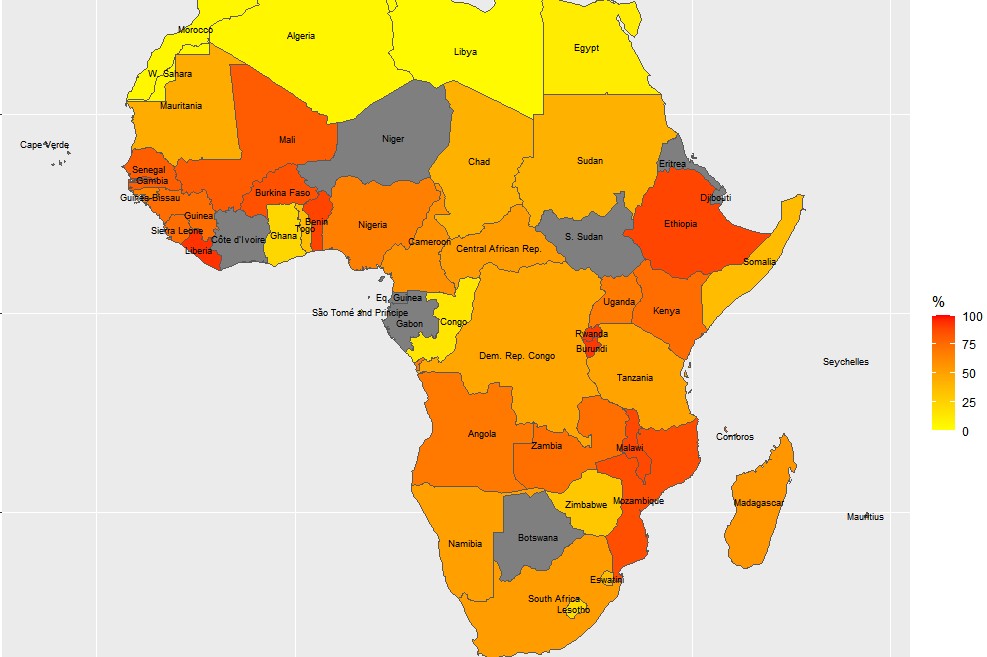These measures – known as non-pharmacological public health interventions (NPIs) and including physical distancing or isolation at home to prevent transmission – are among the simplest and least expensive methods to slow the spread of SARS-CoV-2, the virus that causes COVID-19. Yet huge numbers of Africa’s roughly 1.4 billion people do not have access to these tools, researchers said.
The findings, led by an international team including Professor David Gordon at the Bristol Poverty Institute and Dr Timothy Brewer at the University of California Los Angeles (UCLA), analysed nationally representative household demographic and socioeconomic data, which were used to create vulnerability indices regarding NPIs.
Dr Timothy Brewer, UCLA Fielding School of Public Health Professor of Epidemiology and Professor of Medicine at UCLA said: “Hundreds of millions of people across Africa simply lack means for implementing NPIs to prevent SARS-CoV-2 transmission. These populations urgently need to be prioritized for vaccination to prevent disease and to contain the global pandemic.
“SARS-CoV-2 spreads primarily by respiratory droplets generated by coughing, sneezing or talking. Until effective vaccines are universally available, NPIs are the principal means by which governments prevent SARS-CoV-2 transmission in their populations.”
As of now, COVID-19, caused by severe acute respiratory syndrome coronavirus 2 (SARS-CoV-2), has resulted in some 7.3 million cases and 185,505 deaths across the continent. Globally, nearly 210 million cases and 4.4 million deaths have been reported in more than 200 countries, although total mortality due to COVID-19 may be as high as seven million deaths. The global COVID-19 case fatality ratio approximates that of the 1918 H1N1 Influenza pandemic.
In addition to isolation of those infected and contact tracing and quarantine for those exposed, the World Health Organization (WHO) recommends physical distancing, masking in public places and hand washing as important NPIs that countries should employ for COVID-19 prevention and control. Laboratory-based and observational studies suggest that physical distancing and the wearing of face masks may reduce SARS-CoV-2 transmission by at least 80 per cent.
Across the 54 countries, approximately 718 million people live in households with more than six individuals at home. Approximately 283 million people live in households where more than three people slept in a single room. An estimated 890 million Africans lack on-site water, while 700 million lack in-home soap/washing facilities.
Professor Gordon, Director of the Bristol Poverty Institute, the Townsend Centre for International Poverty Research and one of the study’s co-authors, added: “Unfortunately, impoverished living conditions mean that it is almost impossible for many people in African countries to follow public health advice and protect themselves from the virus. European and North American countries need to stop hoarding millions of doses of vaccines that they will never be able to use and make them available to people in Africa.”
The researchers also made the point that despite the structural and resource issues faced by governments in Africa, some nation’s responses to COVID have been among the best in the world.
Dr Mary Zhang, Senior Research Associate at Bristol’s School for Policy Studies, added: “The Perivoli Africa Research Centre (PARC) is a major new University of Bristol initiative which has helped us to make use of the most up-to-date survey data to identify people in Africa who are vulnerable to COVID19 infections because of their living conditions.”
Dr Jody Heymann, a UCLA distinguished professor of public health, public policy, and medicine who serves as director of the Fielding School's WORLD Policy Analysis Center (WORLD): “These findings illustrate the substantial barriers many African households face in keeping safe from SARS-CoV-2 infection because of living conditions that preclude their ability to quarantine, isolate or maintain physical distancing and because of substantial obstacles to handwashing. Crucially, the findings raise the urgency of getting vaccines rapidly to all countries in Africa, which lag far behind, and for addressing the underlying conditions of poverty that place populations at increased risk from respiratory virus outbreaks and pandemics.”
Funding: This work was supported by the Economic and Social Research Council (ESRC) via the Research and Innovation Global Challenge Research Fund (GCRF) (Grant Ref: ES/T010487/1), the Conrad N. Hilton Foundation, the Bill and Melinda Gates Foundation, the Elisabeth Blackwell Institute for Health Research and the Beatriu de Pinós fellowship program.
Paper
Housing, sanitation and living conditions affecting SARS-CoV-2 prevention interventions in 54 African countries. Brewer TF et al (2021). Epidemiology and Infection 149, e183, 1–6. https://doi.org/10.1017/S0950268821001734
